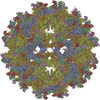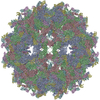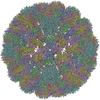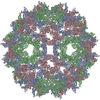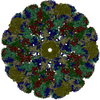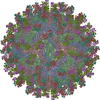[English] 日本語
 Yorodumi
Yorodumi- EMDB-2141: 6A Electron cryomicroscopy structure of immature Dengue virus ser... -
+ Open data
Open data
- Basic information
Basic information
| Entry | Database: EMDB / ID: EMD-2141 | |||||||||
|---|---|---|---|---|---|---|---|---|---|---|
| Title | 6A Electron cryomicroscopy structure of immature Dengue virus serotype 1 | |||||||||
 Map data Map data | immature Dengue virus 1 | |||||||||
 Sample Sample |
| |||||||||
 Keywords Keywords |  flavivirus / dengue virus serotype 1 / immature / e protein / prM protein / flavivirus / dengue virus serotype 1 / immature / e protein / prM protein /  capsid protein capsid protein | |||||||||
| Function / homology |  Function and homology information Function and homology informationsymbiont-mediated suppression of host JAK-STAT cascade via inhibition of host TYK2 activity / host cell mitochondrion / symbiont-mediated suppression of host JAK-STAT cascade via inhibition of STAT2 activity / symbiont-mediated suppression of host cytoplasmic pattern recognition receptor signaling pathway via inhibition of MAVS activity / ribonucleoside triphosphate phosphatase activity / : /  viral capsid / viral capsid /  double-stranded RNA binding / protein complex oligomerization / monoatomic ion channel activity ...symbiont-mediated suppression of host JAK-STAT cascade via inhibition of host TYK2 activity / host cell mitochondrion / symbiont-mediated suppression of host JAK-STAT cascade via inhibition of STAT2 activity / symbiont-mediated suppression of host cytoplasmic pattern recognition receptor signaling pathway via inhibition of MAVS activity / ribonucleoside triphosphate phosphatase activity / : / double-stranded RNA binding / protein complex oligomerization / monoatomic ion channel activity ...symbiont-mediated suppression of host JAK-STAT cascade via inhibition of host TYK2 activity / host cell mitochondrion / symbiont-mediated suppression of host JAK-STAT cascade via inhibition of STAT2 activity / symbiont-mediated suppression of host cytoplasmic pattern recognition receptor signaling pathway via inhibition of MAVS activity / ribonucleoside triphosphate phosphatase activity / : /  viral capsid / viral capsid /  double-stranded RNA binding / protein complex oligomerization / monoatomic ion channel activity / clathrin-dependent endocytosis of virus by host cell / double-stranded RNA binding / protein complex oligomerization / monoatomic ion channel activity / clathrin-dependent endocytosis of virus by host cell /  mRNA (nucleoside-2'-O-)-methyltransferase activity / mRNA 5'-cap (guanine-N7-)-methyltransferase activity / mRNA (nucleoside-2'-O-)-methyltransferase activity / mRNA 5'-cap (guanine-N7-)-methyltransferase activity /  RNA helicase activity / host cell endoplasmic reticulum membrane / RNA helicase activity / host cell endoplasmic reticulum membrane /  protein dimerization activity / induction by virus of host autophagy / viral RNA genome replication / protein dimerization activity / induction by virus of host autophagy / viral RNA genome replication /  RNA-dependent RNA polymerase activity / serine-type endopeptidase activity / fusion of virus membrane with host endosome membrane / RNA-dependent RNA polymerase activity / serine-type endopeptidase activity / fusion of virus membrane with host endosome membrane /  viral envelope / symbiont-mediated suppression of host type I interferon-mediated signaling pathway / structural molecule activity / virion attachment to host cell / virion membrane / viral envelope / symbiont-mediated suppression of host type I interferon-mediated signaling pathway / structural molecule activity / virion attachment to host cell / virion membrane /  proteolysis / extracellular region / proteolysis / extracellular region /  ATP binding / ATP binding /  membrane / membrane /  metal ion binding metal ion bindingSimilarity search - Function | |||||||||
| Biological species |   Dengue virus 1 Dengue virus 1 | |||||||||
| Method |  single particle reconstruction / single particle reconstruction /  cryo EM / Resolution: 6.0 Å cryo EM / Resolution: 6.0 Å | |||||||||
 Authors Authors | Kostyuchenko VA / Zhang Q / Tan LC / Ng TS / Lok SM | |||||||||
 Citation Citation |  Journal: J Virol / Year: 2013 Journal: J Virol / Year: 2013Title: Immature and mature dengue serotype 1 virus structures provide insight into the maturation process. Authors: Victor A Kostyuchenko / Qian Zhang / Joanne L Tan / Thiam-Seng Ng / Shee-Mei Lok /  Abstract: Dengue virus is a major human pathogen that has four serotypes (DENV1 to -4). Here we report the cryoelectron microscopy (cryo-EM) structures of immature and mature DENV1 at 6- and 4.5-Å resolution, ...Dengue virus is a major human pathogen that has four serotypes (DENV1 to -4). Here we report the cryoelectron microscopy (cryo-EM) structures of immature and mature DENV1 at 6- and 4.5-Å resolution, respectively. The subnanometer-resolution maps allow accurate placement of all of the surface proteins. Although the immature and mature viruses showed vastly different surface protein organizations, the envelope protein transmembrane (E-TM) regions remain in similar positions. The pivotal role of the E-TM regions leads to the identification of the start and end positions of all surface proteins during maturation. | |||||||||
| History |
|
- Structure visualization
Structure visualization
| Movie |
 Movie viewer Movie viewer |
|---|---|
| Structure viewer | EM map:  SurfView SurfView Molmil Molmil Jmol/JSmol Jmol/JSmol |
| Supplemental images |
- Downloads & links
Downloads & links
-EMDB archive
| Map data |  emd_2141.map.gz emd_2141.map.gz | 253.7 MB |  EMDB map data format EMDB map data format | |
|---|---|---|---|---|
| Header (meta data) |  emd-2141-v30.xml emd-2141-v30.xml emd-2141.xml emd-2141.xml | 10.6 KB 10.6 KB | Display Display |  EMDB header EMDB header |
| Images |  emd_2141.png emd_2141.png | 434.2 KB | ||
| Archive directory |  http://ftp.pdbj.org/pub/emdb/structures/EMD-2141 http://ftp.pdbj.org/pub/emdb/structures/EMD-2141 ftp://ftp.pdbj.org/pub/emdb/structures/EMD-2141 ftp://ftp.pdbj.org/pub/emdb/structures/EMD-2141 | HTTPS FTP |
-Related structure data
| Related structure data | 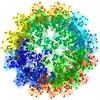 4b03MC  2142C  4cctC M: atomic model generated by this map C: citing same article ( |
|---|---|
| Similar structure data |
- Links
Links
| EMDB pages |  EMDB (EBI/PDBe) / EMDB (EBI/PDBe) /  EMDataResource EMDataResource |
|---|---|
| Related items in Molecule of the Month |
- Map
Map
| File |  Download / File: emd_2141.map.gz / Format: CCP4 / Size: 804.7 MB / Type: IMAGE STORED AS FLOATING POINT NUMBER (4 BYTES) Download / File: emd_2141.map.gz / Format: CCP4 / Size: 804.7 MB / Type: IMAGE STORED AS FLOATING POINT NUMBER (4 BYTES) | ||||||||||||||||||||||||||||||||||||||||||||||||||||||||||||||||||||
|---|---|---|---|---|---|---|---|---|---|---|---|---|---|---|---|---|---|---|---|---|---|---|---|---|---|---|---|---|---|---|---|---|---|---|---|---|---|---|---|---|---|---|---|---|---|---|---|---|---|---|---|---|---|---|---|---|---|---|---|---|---|---|---|---|---|---|---|---|---|
| Annotation | immature Dengue virus 1 | ||||||||||||||||||||||||||||||||||||||||||||||||||||||||||||||||||||
| Voxel size | X=Y=Z: 1.2 Å | ||||||||||||||||||||||||||||||||||||||||||||||||||||||||||||||||||||
| Density |
| ||||||||||||||||||||||||||||||||||||||||||||||||||||||||||||||||||||
| Symmetry | Space group: 1 | ||||||||||||||||||||||||||||||||||||||||||||||||||||||||||||||||||||
| Details | EMDB XML:
CCP4 map header:
| ||||||||||||||||||||||||||||||||||||||||||||||||||||||||||||||||||||
-Supplemental data
- Sample components
Sample components
-Entire : Immature Dengue virus serotype 1
| Entire | Name: Immature Dengue virus serotype 1 |
|---|---|
| Components |
|
-Supramolecule #1000: Immature Dengue virus serotype 1
| Supramolecule | Name: Immature Dengue virus serotype 1 / type: sample / ID: 1000 / Number unique components: 1 |
|---|---|
| Molecular weight | Experimental: 14.5 MDa / Theoretical: 14.5 MDa Method: estimation based on components' amino acid sequences |
-Supramolecule #1: Dengue virus 1
| Supramolecule | Name: Dengue virus 1 / type: virus / ID: 1 / NCBI-ID: 11053 / Sci species name: Dengue virus 1 / Sci species strain: PVP159 (DEN1/SG/07K3640DK1/2008) / Virus type: VIRION / Virus isolate: STRAIN / Virus enveloped: Yes / Virus empty: No |
|---|---|
| Host (natural) | Organism:   Aedes aegypti (yellow fever mosquito) / synonym: INVERTEBRATES Aedes aegypti (yellow fever mosquito) / synonym: INVERTEBRATES |
| Molecular weight | Experimental: 14.5 MDa / Theoretical: 14.5 MDa |
| Virus shell | Shell ID: 1 / Name: E / Diameter: 600 Å / T number (triangulation number): 1 |
-Experimental details
-Structure determination
| Method |  cryo EM cryo EM |
|---|---|
 Processing Processing |  single particle reconstruction single particle reconstruction |
| Aggregation state | particle |
- Sample preparation
Sample preparation
| Buffer | pH: 7.5 |
|---|---|
| Grid | Details: thin carbon film on lacey carbon support, copper grid, plasma cleaned and glow discharged |
| Vitrification | Cryogen name: ETHANE / Chamber humidity: 100 % / Chamber temperature: 100 K / Instrument: FEI VITROBOT MARK IV / Method: blot 1 second before plunging |
- Electron microscopy
Electron microscopy
| Microscope | FEI TITAN KRIOS |
|---|---|
| Electron beam | Acceleration voltage: 300 kV / Electron source:  FIELD EMISSION GUN FIELD EMISSION GUN |
| Electron optics | Calibrated magnification: 75000 / Illumination mode: FLOOD BEAM / Imaging mode: BRIGHT FIELD Bright-field microscopy / Cs: 2.7 mm / Nominal defocus max: 3.5 µm / Nominal defocus min: 0.7 µm / Nominal magnification: 75000 Bright-field microscopy / Cs: 2.7 mm / Nominal defocus max: 3.5 µm / Nominal defocus min: 0.7 µm / Nominal magnification: 75000 |
| Specialist optics | Energy filter - Name: FEI |
| Sample stage | Specimen holder model: FEI TITAN KRIOS AUTOGRID HOLDER |
| Temperature | Min: 99 K / Max: 101 K / Average: 100 K |
| Alignment procedure | Legacy - Astigmatism: Astigmatism was corrected at 250,000 magnification |
| Date | Apr 11, 2012 |
| Image recording | Category: CCD / Film or detector model: GENERIC GATAN (4k x 4k) / Number real images: 838 / Average electron dose: 17.7 e/Å2 / Details: CCD data / Bits/pixel: 16 |
| Experimental equipment |  Model: Titan Krios / Image courtesy: FEI Company |
- Image processing
Image processing
| CTF correction | Details: Wiener filter weighting each particle during 3D reconstruction |
|---|---|
| Final reconstruction | Applied symmetry - Point group: I (icosahedral ) / Algorithm: OTHER / Resolution.type: BY AUTHOR / Resolution: 6.0 Å / Resolution method: FSC 0.143 CUT-OFF / Software - Name: GPU-adapted, EMAN1 / Number images used: 7169 ) / Algorithm: OTHER / Resolution.type: BY AUTHOR / Resolution: 6.0 Å / Resolution method: FSC 0.143 CUT-OFF / Software - Name: GPU-adapted, EMAN1 / Number images used: 7169 |
| Details | particles were manually selected |
-Atomic model buiding 1
| Initial model | PDB ID: Chain - #0 - Chain ID: A / Chain - #1 - Chain ID: C |
|---|---|
| Software | Name:  Chimera Chimera |
| Details | Protocol: rigid body. Fit in map feature in Chimera, whole structure was fitted as a rigid body with no apparent need to fit domains separately |
| Refinement | Space: REAL / Protocol: RIGID BODY FIT |
| Output model |  PDB-4b03: |
 Movie
Movie Controller
Controller




